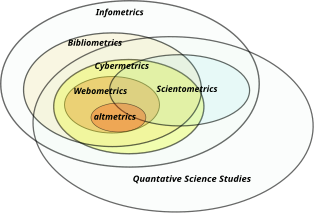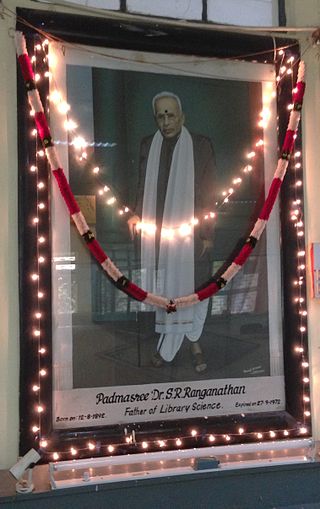Related Research Articles

A library classification is a system of organization of knowledge by which library resources are arranged and ordered systematically. Library classifications are a notational system that represents the order of topics in the classification and allows items to be stored in that order. Library classification systems group related materials together, typically arranged as a hierarchical tree structure. A different kind of classification system, called a faceted classification system, is also widely used, which allows the assignment of multiple classifications to an object, enabling the classifications to be ordered in many ways.

Information science is an academic field which is primarily concerned with analysis, collection, classification, manipulation, storage, retrieval, movement, dissemination, and protection of information. Practitioners within and outside the field study the application and the usage of knowledge in organizations in addition to the interaction between people, organizations, and any existing information systems with the aim of creating, replacing, improving, or understanding the information systems.

A library catalog is a register of all bibliographic items found in a library or group of libraries, such as a network of libraries at several locations. A catalog for a group of libraries is also called a union catalog. A bibliographic item can be any information entity that is considered library material, or a group of library materials, or linked from the catalog as far as it is relevant to the catalog and to the users (patrons) of the library.

This page is a glossary of library and information science.

Shiyali Ramamrita Ranganathan was a librarian and mathematician from India. His most notable contributions to the field were his five laws of library science and the development of the first major faceted classification system, the colon classification. He is considered to be the father of library science, documentation, and information science in India and is widely known throughout the rest of the world for his fundamental thinking in the field. His birthday is observed every year as the National Librarian Day in India.

The five laws of library science is a theory that S. R. Ranganathan proposed in 1931, detailing the principles of operating a library system. Many librarians from around the world accept the laws as the foundations of their philosophy.
A faceted classification is a classification scheme used in organizing knowledge into a systematic order. A faceted classification uses semantic categories, either general or subject-specific, that are combined to create the full classification entry. Many library classification systems use a combination of a fixed, enumerative taxonomy of concepts with subordinate facets that further refine the topic.

In library and information science, cataloging (US) or cataloguing (UK) is the process of creating metadata representing information resources, such as books, sound recordings, moving images, etc. Cataloging provides information such as author's names, titles, and subject terms that describe resources, typically through the creation of bibliographic records. The records serve as surrogates for the stored information resources. Since the 1970s these metadata are in machine-readable form and are indexed by information retrieval tools, such as bibliographic databases or search engines. While typically the cataloging process results in the production of library catalogs, it also produces other types of discovery tools for documents and collections.

The following outline is provided as an overview of and topical guide to library science:
A bibliographic database is a database of bibliographic records, an organized digital collection of references to published literature, including journal and newspaper articles, conference proceedings, reports, government and legal publications, patents, books, etc. In contrast to library catalogue entries, a large proportion of the bibliographic records in bibliographic databases describe articles, conference papers, etc., rather than complete monographs, and they generally contain very rich subject descriptions in the form of keywords, subject classification terms, or abstracts.

Library and information science(s) or studies (LIS) is an interdisciplinary field of study that deals generally with organization, access, collection, and protection/regulation of information, whether in physical or digital forms.
Knowledge organization (KO), organization of knowledge, organization of information, or information organization is an intellectual discipline concerned with activities such as document description, indexing, and classification that serve to provide systems of representation and order for knowledge and information objects. According to The Organization of Information by Joudrey and Taylor, information organization:
examines the activities carried out and tools used by people who work in places that accumulate information resources for the use of humankind, both immediately and for posterity. It discusses the processes that are in place to make resources findable, whether someone is searching for a single known item or is browsing through hundreds of resources just hoping to discover something useful. Information organization supports a myriad of information-seeking scenarios.
Inspec is a major indexing database of scientific and technical literature, published by the Institution of Engineering and Technology (IET), and formerly by the Institution of Electrical Engineers (IEE), one of the IET's forerunners.
Faceted search is a technique that involves augmenting traditional search techniques with a faceted navigation system, allowing users to narrow down search results by applying multiple filters based on faceted classification of the items. It is sometimes referred to as a parametric search technique. A faceted classification system classifies each information element along multiple explicit dimensions, called facets, enabling the classifications to be accessed and ordered in multiple ways rather than in a single, pre-determined, taxonomic order.
Aboutness is a term used in library and information science (LIS), linguistics, philosophy of language, and philosophy of mind. In LIS, it is often considered synonymous with subject (documents). In the philosophy of mind it has been often considered synonymous with intentionality, perhaps since John Searle (1983). In the philosophy of logic and language it is understood as the way a piece of text relates to a subject matter or topic. In general, the term refers to the concept that a text, utterance, image, or action is on or of something.

Library science is an interdisciplinary or multidisciplinary field that applies the practices, perspectives, and tools of management, information technology, education, and other areas to libraries; the collection, organization, preservation, and dissemination of information resources; and the political economy of information. Martin Schrettinger, a Bavarian librarian, coined the discipline within his work (1808–1828) Versuch eines vollständigen Lehrbuchs der Bibliothek-Wissenschaft oder Anleitung zur vollkommenen Geschäftsführung eines Bibliothekars. Rather than classifying information based on nature-oriented elements, as was previously done in his Bavarian library, Schrettinger organized books in alphabetical order. The first American school for library science was founded by Melvil Dewey at Columbia University in 1887.
Derek Austin was a librarian and author.
In library and information science documents are classified and searched by subject – as well as by other attributes such as author, genre and document type. This makes "subject" a fundamental term in this field. Library and information specialists assign subject labels to documents to make them findable. There are many ways to do this and in general there is not always consensus about which subject should be assigned to a given document. To optimize subject indexing and searching, we need to have a deeper understanding of what a subject is. The question: "what is to be understood by the statement 'document A belongs to subject category X'?" has been debated in the field for more than 100 years
Elaine Svenonius is an American librarian and library scholar, known for her research on bibliographic control, particularly cataloging, classification, and indexing. She is best known for bringing a philosophical knowledge organization approach to cataloging theory.
Phyllis Allen Richmond was a historian of science and librarian recognized for her work in classification and cataloging. Her dissertation "Americans and the Germ Theory of Disease" was a leading theory of history of medicine for nearly 40 years and she later published seminal work in classification theory.
References
- 1 2 3 Barre, Kathryn La (2010-05-01). "Pauline Atherton Cochrane: Weaving Value from the Past". Libraries & the Cultural Record. 45 (2): 210–237. doi:10.1353/lac.0.0120. ISSN 2166-3033. S2CID 201769200.
- ↑ "Redesign of catalogs and indexes for improved online subject access : selected papers of / Pauline A Cochrane. - Version details". Trove. Retrieved 2018-11-27.
- ↑ Berman, Sanford (2001-07-01). "Saving the Time of the Library User through Subject Access Innovation: Papers in Honor of Pauline Atherton Cochrane. Ed. William J. Wheeler. Champaign, Ill.: Graduate School of Library and Information Science, Univ. of Illinois, 2000. 217p. $30 (ISBN 0878451080)". College & Research Libraries. American Library Association. 62 (4): 383–384. doi: 10.5860/crl.62.4.383 . ISSN 2150-6701.
- ↑ La Barre, Kathryn. "Weaving Webs of Significance: The Classification Research Study Group in the United States and Canada" . Retrieved 27 November 2018.
- ↑ "COCHRNE". personal.kent.edu. 1999-04-14. Retrieved 2018-11-20.
- ↑ "Pauline Atherton Cochrane - ASIST". ASIST | The Information Association for the Information Age. Retrieved 2018-11-27.
- ↑ Coyle, Karen (2016-07-04). "Catalogs and Content: an Interlude". Coyle's InFormation. Retrieved 2018-11-27.
- ↑ Cochrane, Pauline Atherton (Feb 1984). "Modern Subject Access in the Online Age: Lesson 1". American Libraries. 15 (2): 80–83. JSTOR 25626614.
- ↑ Cochrane, Pauline Atherton; Mandel, Carol; Mischo, William; Harper, Shirley; Buckland, Michael; Pietris, Mary K. D.; Rather, Lucia J.; Croxton, Fred E. C. (May 1984). "Modern Subject Access in the Online Age: Lesson 1". American Libraries. 15 (5): 336–339. JSTOR 25626747.